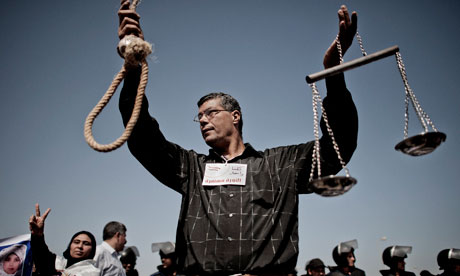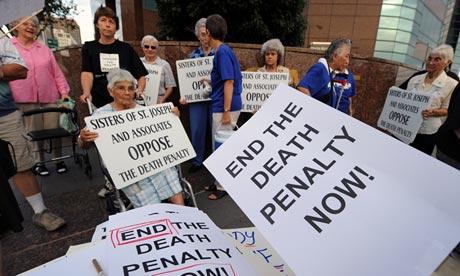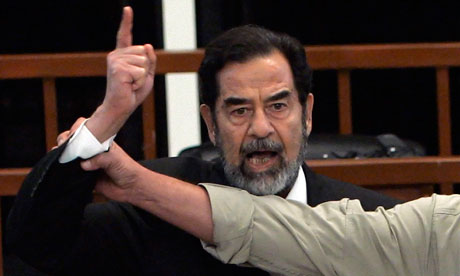Amnesty International report claims death penalty is declining worldwide
Human rights charity encouraged by global trend but says setbacks in Asia Pacific and Middle East are disappointing
guardian.co.uk, <time itemprop="datePublished" datetime="2013-04-10T08:42BST" pubdate="" style="padding: 0px; margin: 0px; border-collapse: collapse; background-repeat: no-repeat no-repeat;">Wednesday 10 April 2013 08.42 BST</time>

Death penalty worldwide – an anti-Hosni Mubarak protester in Cairo calls for the execution of Egypt's ousted president. Photograph: Luca Sola/Corbis
Only one in 10 countries in the world carried out capital punishment last year, as the global trend towards the abolition of the death penalty continued, with some progress in Africa, "disappointing" setbacks in Asia Pacific and great concerns about the Middle East, according to a report.
China, Iran, Iraq, Saudi Arabia and the US carried out the most executions in 2012, according to Amnesty International's annual report on death sentences and capital punishment, published on Wednesday. Yemen was not far behind the five.
Globally, at least 682 executions were confirmed to have been carried out in 2012, two more than in 2011, the 60-page report showed. However, this number does not include executions in China, which maintains a great deal of secrecy about its use of the capital punishment, nor in Syria, where documenting such figures was made impossible by the civil war.
Since 2009, Amnesty has declined to release estimates about the number of executions in China, which is believed to be in the several thousands, more than the rest of the world combined.
In 2012, only 21 countries were known to have carried out executions, the same as the year before. More than two-thirds of the world's countries –140 – are classified as nations that have either abandoned the death penalty or are no longer implementing it.

Anti-death penalty campaigners in Los Angeles. Photograph: AFP/GettySetting
China aside, Iran had the worst record last year, executing at least 314 people. Most of those put to death were convicted on drug-trafficking offences, but a number of crimes not considered "most serious" under international law, such as alcohol consumption, adultery – and even homosexuality, can send a convict to the gallows. Iran is also notorious for its public hangings.
"Iran continued to impose death sentences on juvenile offenders, in violation of international law," Amnesty said.
The UN special rapporteur tasked with investigating the country's human rights record also issued warnings in his latest report, published last month, about Iran's high rate of execution, complaining about "the absence of fair trial standards" in the country.
In 2012, Amnesty said there was "credible evidence" that Iran also put convicts to death in secret, which would bring the minimum figure acknowledged by the officials up from 314 to 544. Iraq executed at least 129 people,61 more than the minimum known figure for 2011 – an alarming escalation since 2010, when Iraqi authorities acknowledged only one execution.
In 2012, it executed 34 people in a single day. Saudi Arabia executed at least 79, the US 43, Yemen 28, Sudan 19, Afghanistan 14 and Somalia 12. In Egypt, Amnesty said it could not confirm whether executions took place because information was difficult to obtain.
There was some progress, too. Latvia was the 97th country last year to remove capital punishment from its legislation. Europe and the Americas would have been execution-free if Belarus and the US had abolished the death penalty. The number of countries that handed down death sentences in 2012 was down from 63 to 58 in 2011.

Saddam Hussein protests as the death penalty is handed down. Photograph: APIn Africa, Benin moved to abolish the death penalty and Ghana said it had plans to do the same, while Sierra Leone had no prisoners on death row.
In the US, the number of executions in 2012 was identical to 2011, though only nine states carried executions compared with 13 in 2011.
Despite this, a number of countries in Asia Pacific that had not carried executions for a number of years did so in 2012, such as India, which executed one person, Japan seven, Pakistan one and Gambia nine.
"The regression we saw in some countries this year was disappointing, but it does not reverse the worldwide trend against using the death penalty. In many parts of the world, executions are becoming a thing of the past," said Salil Shetty, Amnesty's secretary general.
"Only one in 10 countries in the world carries out executions. Their leaders should ask themselves why they are still applying a cruel and inhumane punishment that the rest of the world is leaving behind," he added.
"Governments still executing have run out of arguments to justify themselves. There is no evidence whatsoever to indicate that the death penalty works as a special deterrent against crime.
"The real reason for the death penalty's use can often be found elsewhere. In 2012, we were once again very concerned to see countries executing for what appeared to be political purposes, either as a populist measure or as an outright tool of repression."
Beheading, hanging, firing squad and lethal injection were among some of the methods used globally. Convicts were executed for a range of crimes such as drug-related offences but also a number of charges that Amnesty said should not be considered crimes at all such as apostasy, blasphemy and adultery.
More than 23,000 people were on death row worldwide at the end of 2012, according to the report.
